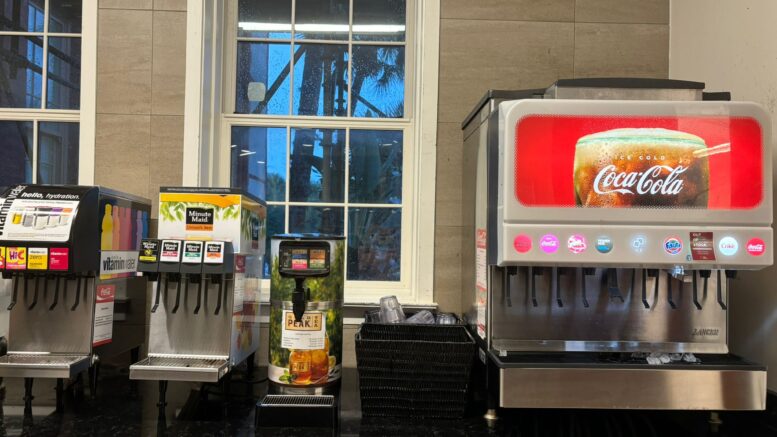By Claire Buri
Big cars, fast food and patriotism. If you were to ask people in Germany what they associate with the United States, they would almost certainly say these words.
When I stepped onto American soil for the first time— only four weeks ago— on my way to start my exchange semester at Flagler College, I was amazed. But it wasn’t the culture shock of coming from the University of Würzburg, located in the southern part of Germany, that made me feel astonished. It wasn’t that many things were completely different from Germany. Rather, it was that I had the feeling all of the clichés about America that I heard in Germany had suddenly become reality.
Everything is oversized. Cars are twice as big. The highways often have four lanes. The cornflakes packets are bigger. You can even buy glue in 5 liter packs here.
I am slowly getting used to the size of the cars. The size of the supermarkets also has some advantages. For example, you have everything in one store— so unlike in Germany— and you don’t have to drive back and forth for wall paint and nail polish remover.
But I can’t get over the issue with the size of the packaging. The packs are often not used up, which in turn results in an excessive amount of waste. Why?
I quickly realized that the issue of waste is handled differently in America. In Germany, you are taught from an early age to only fill your plate so that you can eat everything. In the U.S., almost full plates end up in the dish return in the dining hall.
But it doesn’t matter whether it’s the plates in the dining hall, the plastic spoons in the ice cream compartment or the fact that there is no recycling.
The topic of recycling does not seem to have arrived in the U.S. as it has in Europe. In Germany, it’s normal to go shopping with reusable bags. But when I tried to explain to the cashier in America that I would rather put my shopping in my own bag, I felt like I had personally attacked her.

What is also said about Americans is that they are friendly and helpful even to strangers. I realized on my first day that those were not just empty words, but it applies to almost every American.
I was with my friend (who is also a German exchange student) when we got lost on the beach and ended up asking a couple for directions. What we hadn’t expected was that they accompanied us all the way home to ensure we were safe. In Germany, if someone holds the door open for you once in the span of four weeks or you receive a compliment from them, that person must just be in a good mood.
Not to mention strangers asking how you are. But in the U.S., this is normal. Whether you’re out shopping or attending a university, small talk and compliments are no rarity here.
Another unfortunate truth is that the food here is dominated by fast food.
When I read on a card from the Health and Wellness Center that said, “Try To Drink Only Water Today,” I thought it was a bad joke. However, after looking at the drink selection in the dining hall, I quickly realized it was no joke— a vending machine with soft drinks, iced tea, juices, and healthy-looking Vitaminwater (which at second glance consists mainly of sugar). Admittedly, the two bottles of water next to it looked a little sad. And the fact that fries, pizza and burgers are on the menu in the dining hall every day speaks for itself.
Yes, at first glance, it seems as if the U.S. and Germany are completely different. Some things are unfamiliar. Some things are overwhelming. Some things are annoying. Others are positively surprising.
But at the very moment I arrived here, I realized one thing: it’s the differences that make traveling to other countries and cultures so valuable and important, because it allows us to question our habits. To look in the mirror and see some things more critically. Or to be grateful for what we have taken for granted all our lives.




Be the first to comment on "Cliché or Truth: Insights into the Impressions of a German Student Abroad in the U.S."